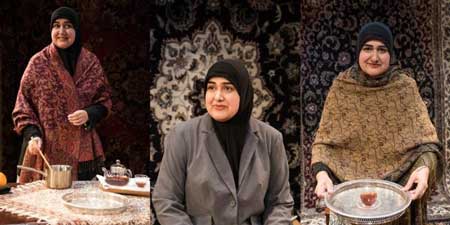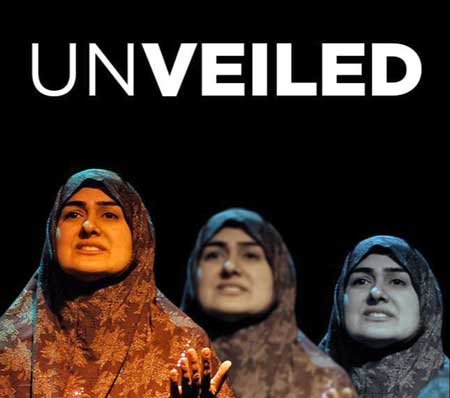Play
Written and performed by Rohina Malik
Greater Boston Stage Company
Stoneham, MA
February 7-16, 2018
Co-Presented by New Repertory Theatre

Courtesy of Greater Boston Stage Company
This short, but effective, sequence of stories about different Muslim women, mostly in the United States, ironically emphasizes the principal image of the hijab, or head scarf, as that which might need unveiling. But, as one of the narratives eloquently indicates, what really needs unveiling are the hearts of those whose hateful responses to those who wear Muslim attire are recounted in most of these stories.
Vivid is the story of the woman who fights against the conventional expectations of her father to marry her off to a solid, but undesirable, mate, and manages to get his blessing to marry the guy she’s met in school, a white convert to Islam, whom she loves. Tragically, facing up to an attempted attack on his wife outside a wedding they are attending, he is murdered.
In another dramatic, but less tragic, account, a woman goes to the wedding of her best friend and is confronted by a white man who raises his fist to her. Instead of attending the wedding, the woman gets involved in dealing with police over the incident.
An African-American woman convert to Islam gives a personal account of her journey, and a rap sequence by an Indian Muslim rapper provides some energetic diversion in the midst of other dominantly tragic accounts.
The tales are embellished by sweet touches about different types of tea. One woman is very proud of her invention of chocolate chai; a specific account of how to make it is included. Earnest and exploratory, this production sets its intense narratives within the context of familiar accounts which use the food and tea theme to gain access to the audience before the difficulties are described.
The show is followed up by a talkback with Malik, the playwright-performer, and an an integral feature of the performance.

Malik’s performance is effective and heartfelt. Some of the stories – particularly about the tragic murder of the hard-won Muslim convert husband – are wrenching. The effect is to provide a small but potent taste of what it’s like to be on the receiving end of anti-Muslim prejudice, often based on one’s garb, in the United States, especially after the 9/11 attacks. The overreaching metaphor – that it’s not visible headscarves that are the real issue but the hidden veils that prevent one from connecting with one’s fellows – comes through loud and clear.
– BADMan
Leave a Reply